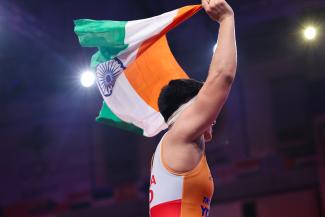Legendary Icho Joins Japan National Team Staff in Run-Up to Paris Olympics
Tuesday, December 28, 2021 - 15:14 By Ken Marantz

TOKYO (December 28) -- If anyone knows how to deal with pressure, it would be the only woman to win four gold medals in the same event in Olympic history.
That was behind the decision of the Japan Wrestling Federation to add Kaori ICHO to its performance enhancement team in the run-up to the 2024 Paris Olympics, appointing her to the newly established position of "entourage coach."
The federation announced the appointment following a meeting of its board of directors on December 19 at the recent Emperor's Cup All-Japan Championships.
Two-time Olympic medalist Kosei AKAISHI was named the director of performance enhancement for the national team.
"I think that athletes have worries before matches and other times," Akaishi said. "Ms. Icho has been to the Olympics, and can (provide support) from both mental aspect and technical aspect."
Icho, 37, was named along with former world silver medalist and two-time Olympian Takahiro WADA as entourage coaches, whose main responsibility will be to provide mental support for national team members and coordinate those around them to ensure the best possible training environment.
The Japan Olympic Committee (JOC) defines the position as "those involved in developing a competitive environment and collaborating so that athletes can maximize their performance."
Icho reportedly had to think hard about accepting the offer. Akaishi said he offered the position to Icho in early November and she only recently made her decision to accept.
Tokyo Olympic gold medalist Yui SUSAKI is among those who are glad she did. "It is a great plus for such a renowned predecessor to become a coach," Susaki told Nikkan Sports. "I'm really looking forward to it."
Susaki, who did not compete at the Emperor's Cup but was there to support her Waseda University teammates, foresees getting advice from Icho in her bid to defend the Olympic 50kg title in Paris. "I want to learn what it takes to win consecutive titles, and I'll start thinking about what to ask," she said.
Icho secured a legendary place in sports history when she became just the fifth athlete, and the first woman, to win gold medals in the same event at four Olympics. (Greco wrestler Mijain LOPEZ (CUB) joined the elite group at Tokyo 2020). Icho struck gold at Athens 2004, Beijing 2008, London 2012 and Rio de Janeiro 2016, the first three at 63kg and the last at 58kg.
Her bid for a fifth Olympic title ended when she lost a playoff at 57kg with fellow Rio champion Risako KAWAI in 2019. She did, however, make an appearance at the Tokyo Olympics, wearing a blue kimono instead of a singlet as she presented Susaki with the bouquet at the medal ceremony.
Although not officially retired, Icho, also a 10-time world champion, has been serving as a women's coach at Nippon Sports Science University and helped Miwa MORIKAWA win a silver medal at the 2021 World Championships at 65kg.
Akaishi won a silver medal at freestyle 62kg at the 1984 Los Angeles Olympics and a bronze at 68kg at the 1992 Barcelona Olympics. He also competed at the 1988 Seoul Olympics.
Shoko YOSHIMURA, Susaki's coach at the JOC Elite Academy who still sits in her corner during matches, was named as one of two assistant directors of performance enhancement, along with former Olympian and Greco national team member Masatoshi TOYOTA.


Share your thoughts.
Comments